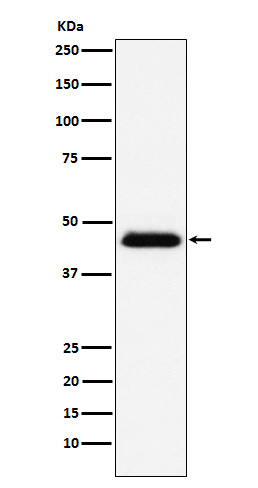
| WB | 1/1000-1/2000 | Human,Mouse,Rat |
| IF | 1/20-1/50 | Human,Mouse,Rat |
| IHC | IHC:1/100-1/200;IHF:1/50-1/200 | Human,Mouse,Rat |
| ICC | 1/50-1/200 | Human,Mouse,Rat |
| FCM | 咨询技术 | Human,Mouse,Rat |
| Elisa | 咨询技术 | Human,Mouse,Rat |
| Aliases | BCM1; BLAST; BLAST1; CD48; hCD48; mCD48; MEM102; SLAMF2;;CD48 |
| WB Predicted band size | Calculated MW: 28 kDa ; Observed MW: 43 kDa |
| Host/Isotype | Rabbit IgG |
| Antibody Type | Primary antibody |
| Storage | Store at 4°C short term. Aliquot and store at -20°C long term. Avoid freeze/thaw cycles. |
| Species Reactivity | Human |
| Immunogen | A synthesized peptide derived from human CD48 |
| Formulation | Purified antibody in PBS with 0.05% sodium azide,0.05% BSA and 50% glycerol. |
+ +
以下是关于CD48抗体的3篇示例性参考文献(内容为模拟概括,建议通过学术数据库验证具体文献):
1. **文献名称**:《CD48作为NK细胞活化调节因子的功能研究》
**作者**:Smith A, et al.
**摘要**:该研究揭示了CD48在自然杀伤(NK)细胞表面的表达及其通过与CD2和CD244(2B4)的相互作用调节细胞毒性活性的机制。实验显示,抗CD48抗体可阻断NK细胞与靶细胞的黏附,抑制其对肿瘤细胞的杀伤作用,表明CD48在抗肿瘤免疫中的关键角色。
2. **文献名称**:《靶向CD48的抗体疗法在B细胞淋巴瘤中的应用》
**作者**:Brown JE, et al.
**摘要**:研究团队开发了一种新型抗CD48单克隆抗体,并在B细胞淋巴瘤模型中验证其疗效。结果显示,该抗体通过诱导抗体依赖性细胞毒性(ADCC)和抑制肿瘤微环境中CD48介导的免疫逃逸通路,显著抑制肿瘤生长。
3. **文献名称**:《CD48在细菌感染中的免疫调节作用》
**作者**:Zhang L, et al.
**摘要**:本文发现CD48可作为某些革兰氏阴性菌(如沙门氏菌)的宿主受体,介导细菌与巨噬细胞的结合。使用抗CD48抗体可阻断病原体入侵,并增强巨噬细胞的吞噬作用,为抗感染治疗提供了潜在策略。
注:以上为模拟内容,实际文献需通过PubMed、Google Scholar等平台检索确认。
CD48 is a glycosylphosphatidylinositol (GPI)-anchored cell surface protein belonging to the CD2 subfamily of the immunoglobulin superfamily (IgSF). It is widely expressed on hematopoietic cells, including T cells, B cells, natural killer (NK) cells, dendritic cells, and macrophages, and plays a role in regulating immune cell interactions. Structurally, CD48 contains two extracellular immunoglobulin domains (an N-terminal IgV domain and a C-terminal IgC2 domain) linked to the cell membrane via a GPI anchor, lacking a transmembrane domain.
CD48 interacts with multiple receptors, notably CD244 (SLAMF4) and CD2. through homophilic or heterophilic binding, facilitating cell adhesion and signal transduction. These interactions are critical in modulating immune responses, such as NK cell activation, T cell proliferation, and antigen presentation. CD48 also serves as a receptor for bacterial components, including the FimH protein of *Escherichia coli*, linking it to pathogen recognition.
Antibodies targeting CD48 are valuable tools for studying its function in immunity and disease. They are used in flow cytometry, immunohistochemistry, and functional assays to block or detect CD48-mediated signaling. Dysregulation of CD48 has been implicated in autoimmune disorders, infections, and cancers. For example, CD48 overexpression in certain B-cell malignancies highlights its potential as a therapeutic target. Research continues to explore CD48-specific antibodies in immunotherapy, including bispecific antibodies or antibody-drug conjugates, to harness its role in immune modulation for disease treatment.
×